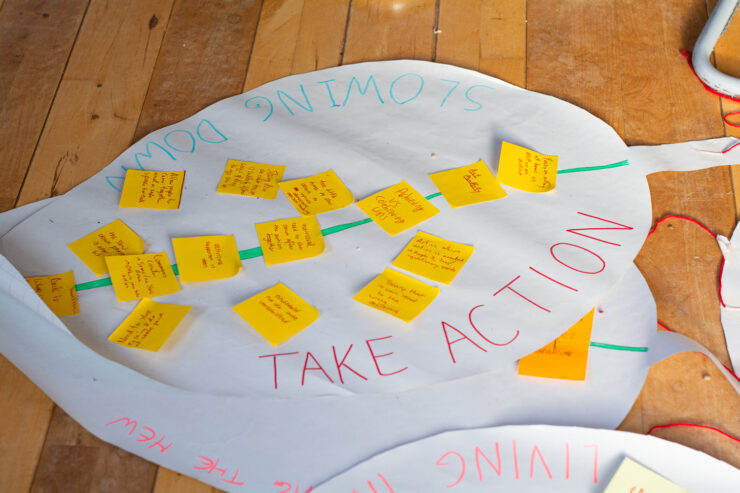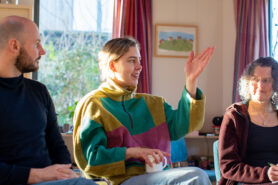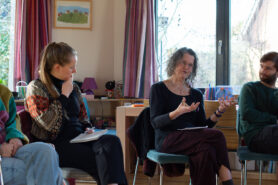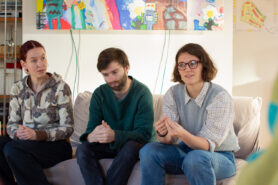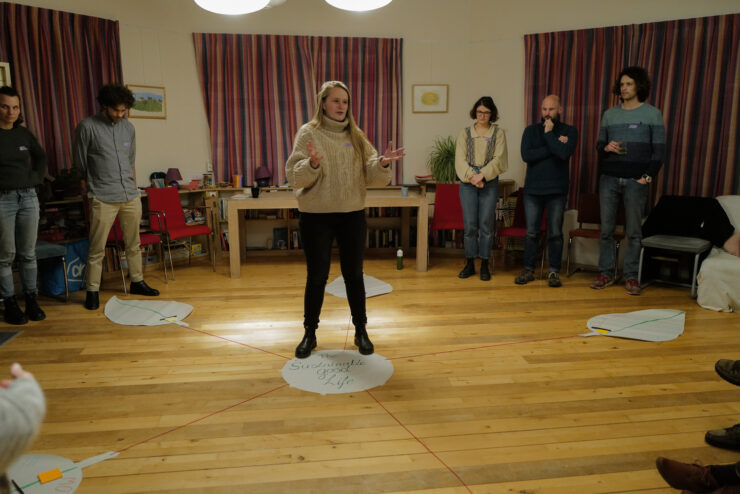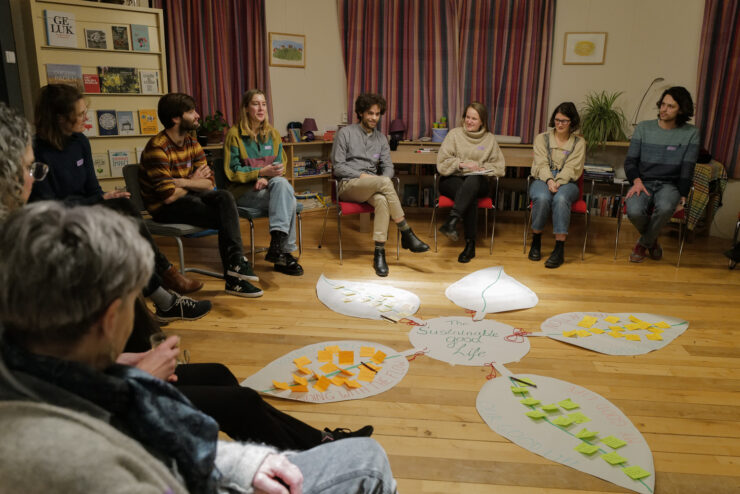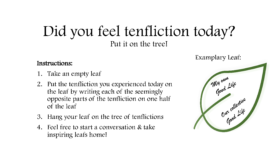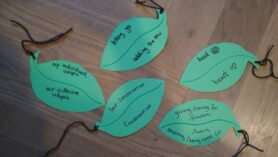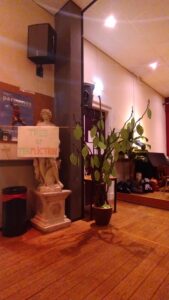News
Let’s become tension facilitators for the sake of utopia (EN)
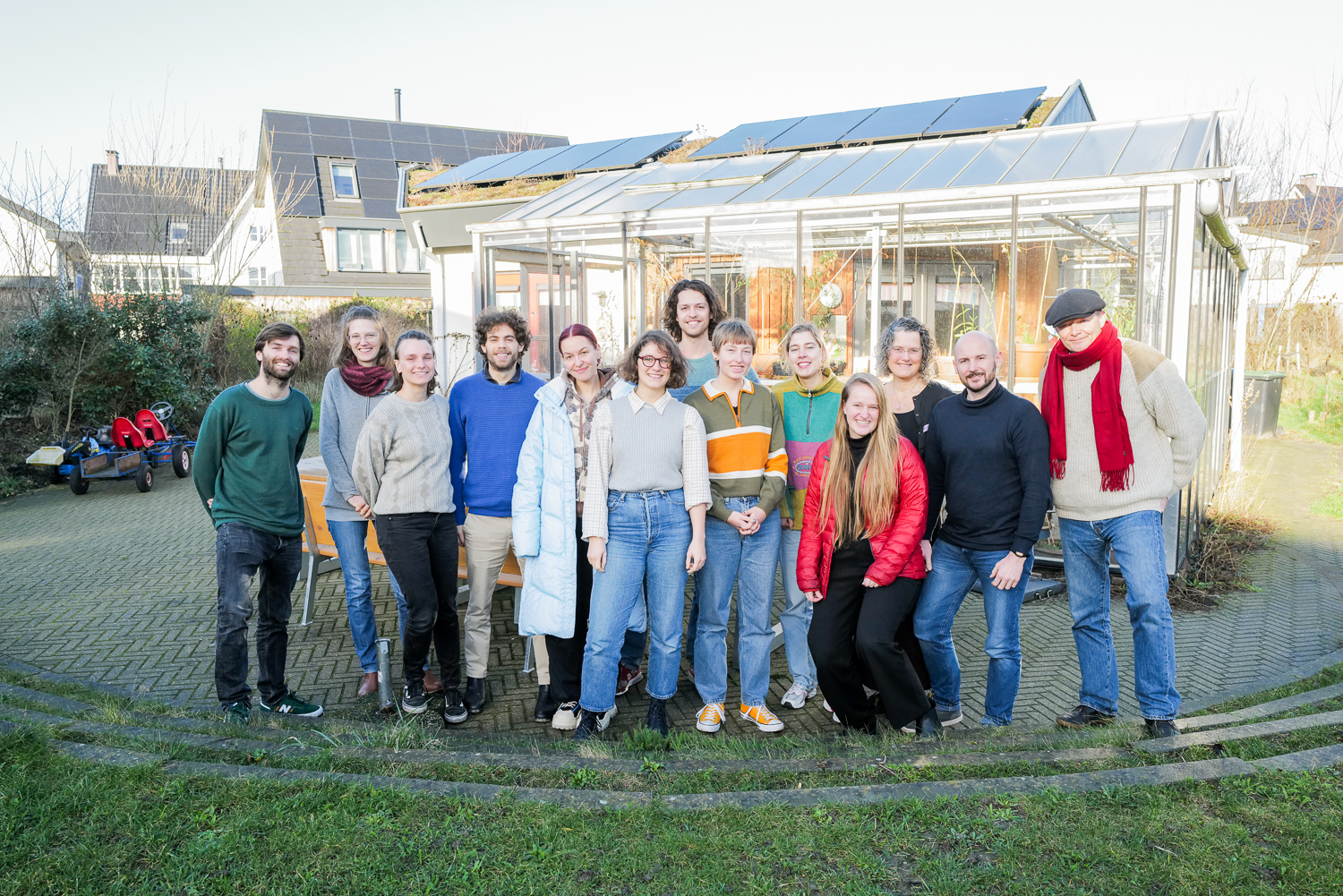
Group photo of a Coalition of Hope (by Hilde Segond von Banchet, 2023)
Dear future-shaper,
This is a Coalition of Hope speaking. Hope in the dark, as the activist scholar Rebecca Solnit puts it. Dark, perhaps, because of the real planetary crisis we face – we need not remind you of that – but dark, especially because it’s impossible to see with certainty what lies ahead.
— A blog post by a Coalition of Hope (Lotte Grunwald, Bart Hamming, Koen Wessels, Kelly Streekstra, Sabine Brander, Stefan Gevaert, Mirjam Scholtens, Jeff Adams, Wouter Buursma, Katrin Enting, Tess Beukema, Ezra Dirks)
The future is fundamentally unsure and open, yet we are all co-responsible for its becoming. In this darkness, hope is like a spark of light shining on lives and futures worth acting for. History teaches us that breakthroughs do happen if – enlightened by hope – people come together, reflect and care deeply, and act with courage and love.
Indeed, the world we inhabit today is permeated by grave social and ecological injustices, and it is urgent to regenerate human presence on Earth in more harmonious, care-full, and reciprocal ways. With these starting points, we – as a relatively small coalition of students, practitioners, and researchers – have been coming together over the past months. Together, we have experience in regenerative farming, sustainable finance, personal leadership, futuring, activism, and more. Together, we have been critically exploring our diverse commitments and struggles related to a sustainable future. In this blog post, we want to share with you what this has brought to light for us, hoping it’ll inspire you in your own process of co-shaping the future
It’s time to embrace tensions.
What we want to share originates in a simple yet powerful experience. The experience that even if we come together with a group of people devoted to a common cause – e.g. to regenerate human presence on Earth in more harmonious, care-full, and reciprocal ways – we run into all these tensions once we try to move forward. In fact, we run into tensions not just ‘between us’, but also ‘within ourselves’. Take, for instance, the following two contrasting voices:
- “I have the desire to travel, connect with loved ones and make cultural experiences”
- “I feel the need to live locally and reduce my personal impact on the environment”
Recognizable? Do you experience both these voices inside yourself? Do you see them in the groups or initiatives you’re a part of? Do you recognize the value and attractiveness of both? We suspect you do. For as a group, we’ve not only run into this and other tensions with each other, we’ve also seen them pop up in recent interactions we’ve had together and individually within the field of sustainability transitions. Yet we’ve also seen something else. We started noticing not just these tensions themselves but also how they are approached. Uncomfortable as they are, we often experience tensions as negative. As things to get rid of. Things to find solutions for, things to resolve.
Having spent some time together experimenting and playing with tensions like the one mentioned above, we want to suggest a different view. We want to propose embracing tensions, not as an end in itself but as a prerequisite for learning and meaningful change. We want to suggest, indeed, that whereas we tend to experience tensions as paralyzing conflicts, we can also experience them as generative. Tensions invite us to look at things holistically, welcome all parts of ourselves, and look for ways forward that do justice to complexity. The magic happens when we start to explore tensions, and start to see the value that resides on both sides. Within ourselves, within communities, and within society at large. If done with care and openness, this sparks hope in the dark and invites acting together in ways previously considered impossible.
Okay, let’s get a bit more concrete, shall we? What do we mean with a tension, and which tensions are we talking about? To begin to answer these questions, we decided to come up with a word of our own (actually, we felt the word ‘tension’ didn’t quite grasp what we were trying to express), a definition, a metaphor, and the beginning of a typology. Let’s start with the word and definition:
Tenfliction
[ten-flik-shuhn] • Noun
The feeling of being torn between significant but seemingly opposite worldviews, approaches, interests, ways to go, values or emotions. • “Should I take climate action or slow down my lifestyle? I feel tenflicted…”
To accompany and explain this definition, let us consider the metaphor of a leaf. For a leaf to grow strong, it needs to have a midrib (in Dutch: hoofdnerf). Branching out from the midrib, veins grow in opposite directions, giving the leaf two sides. As the leaf grows into its full form, the veins bend towards the tip of the leaf, where they meet, and the leaf becomes whole. To become whole, maintain wholeness, and flourish fully, a leaf needs to invest its energy in opposing directions. Ultimately, these opposing directions are part of a bigger, integrative creation process.
Notably, also, if you were to be a small animal, let’s say a frog, and you were to stand on a leaf, you would hopelessly fall off if you’d invest all your weight on one side of it. But were you to engage both sides of the leaf, perhaps dance around a bit, you might just be able to stick around, balance and enjoy the view. Like a leaf, we suggest striving for a sincere, appreciative, and creative conversation between the seemingly opposing forces we face when considering and working towards a sustainable good life.
Building on our metaphor of the leaf, it’s possible to look more intently for the different tenflictions at work within communities and groups working towards a sustainable good life. We did so together with the residents of the Ecowijk Mandora, where we spent a 2,5-day work retreat and organized several sessions, and with the participants of the event of rural utopia which we asked to build a “tenfliction tree” with us to spark reflection and conversations around the tenflictions that were experienced at the event.
Read ‘An overview of the main tenflictions’
Let’s become tenfliction facilitators.
As the world faces the unprecedented challenges of the planetary crisis, it is important to listen to the tenflictions present in the discourses and initiatives surrounding them. We invite you, dear reader, to join us in interacting more actively with the tenflictions present in (acting for) a sustainable good life and to take the unique opportunity to facilitate mutual learning and transformation. Our hunch is that a utopic future integrates the wisdom of both sides of the tenflictions we encounter. It’s up to us to lead that wisdom out!
On our personal path of interacting with different tenflictions, particularly the ‘slowing down – act!’ one, we have been inspired by several forms of communication and engagement that emphasize the importance of listening to conflicting feelings, values and viewpoints. We’ve taken inspiration from conversation and conflict resolution methods that radically differ from what we’re used to in contemporary Western society, such as ‘Het Maorigesprek’, or the practice of Deep Democracy. Through our experiences, we understood that such methods can help build trust, foster understanding, and create more equitable and effective solutions to the challenges faced by various communities. Additionally, by emphasizing the importance of diverse perspectives and actively engaging with conflicting viewpoints, such approaches can lead to more creative and sustainable solutions grounded in the community’s collective wisdom and expertise. To inspire you to join us in becoming a tenfliction facilitator, we have also started developing a methodological toolkit of our own. Here is a guideline that offers an entry point into using the leaf metaphor to start addressing tenflictions for mutual learning and transformation!
Read the guideline we created: ‘Pathways through the Forest of Tenflictions’
Let’s facilitate tensions together; utopia lies ahead!
